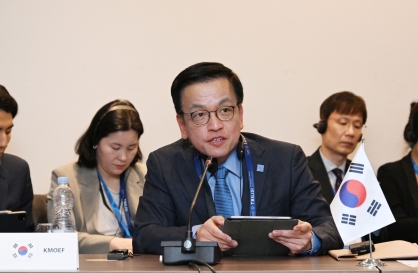Korea to expand incentives to curb inflation pressure
By Korea HeraldPublished : Feb. 23, 2012 - 18:28
Korea will grant more incentives to municipal governments for their anti-inflation efforts in a bid to encourage their cooperation in keeping rising prices from hurting the nation’s overall economy, the top economic policymaker said Thursday.
Korea has been wrestling with high inflation, mostly driven by rising oil and food prices. For 2011, the nation’s consumer prices jumped 4 percent from a year earlier, hitting the upper ceiling of the central bank’s 2-4 percent target band.
“We will increase incentives significantly for municipal governments deemed to be outstanding in helping stabilize prices,” Finance Minister Bahk Jae-wan told an anti-inflation meeting held in central Seoul.
He added that providing more incentives is a “meaningful” action intended to support regional government’s price stabilization efforts “in a market-friendly manner.”
Under the plan, the central government will raise the amount of fiscal incentives set aside for the purpose to 100 billion won ($88.6 million) from the current 60 billion won, officials said.
The move came amid growing concerns that municipalities might be raising their public service charges after Seoul recently decided to hike public transportation fares.
Bahk has expressed concerns that fare hikes for buses and subways in the nation’s capital could prompt other regional governments to follow suit, possibly exerting inflationary pressure. Seoul is home to more than 10 million people.
As for high gasoline prices at the pump here, which is a major inflation-fueling factor, Bahk noted that he will continue to push for measures designed to encourage price declines by boosting competition among gas stations.
He added that the government will launch an electronic trading system for petroleum products in late March, saying that it will help determine their prices not based on international crude costs but based on supply and demand situations in domestic markets. (Yonhap News)
Korea has been wrestling with high inflation, mostly driven by rising oil and food prices. For 2011, the nation’s consumer prices jumped 4 percent from a year earlier, hitting the upper ceiling of the central bank’s 2-4 percent target band.
“We will increase incentives significantly for municipal governments deemed to be outstanding in helping stabilize prices,” Finance Minister Bahk Jae-wan told an anti-inflation meeting held in central Seoul.
He added that providing more incentives is a “meaningful” action intended to support regional government’s price stabilization efforts “in a market-friendly manner.”
Under the plan, the central government will raise the amount of fiscal incentives set aside for the purpose to 100 billion won ($88.6 million) from the current 60 billion won, officials said.
The move came amid growing concerns that municipalities might be raising their public service charges after Seoul recently decided to hike public transportation fares.
Bahk has expressed concerns that fare hikes for buses and subways in the nation’s capital could prompt other regional governments to follow suit, possibly exerting inflationary pressure. Seoul is home to more than 10 million people.
As for high gasoline prices at the pump here, which is a major inflation-fueling factor, Bahk noted that he will continue to push for measures designed to encourage price declines by boosting competition among gas stations.
He added that the government will launch an electronic trading system for petroleum products in late March, saying that it will help determine their prices not based on international crude costs but based on supply and demand situations in domestic markets. (Yonhap News)
-
Articles by Korea Herald





![[Weekender] Korean psyche untangled: Musok](http://res.heraldm.com/phpwas/restmb_idxmake.php?idx=644&simg=/content/image/2024/05/02/20240502050841_0.jpg&u=)

![[Eye Interview] 'If you live to 100, you might as well be happy,' says 88-year-old bestselling essayist](http://res.heraldm.com/phpwas/restmb_idxmake.php?idx=644&simg=/content/image/2024/05/03/20240503050674_0.jpg&u=)










![[Herald Interview] Director of 'Goodbye Earth' aimed to ask how we would face apocalypse](http://res.heraldm.com/phpwas/restmb_idxmake.php?idx=652&simg=/content/image/2024/05/03/20240503050732_0.jpg&u=)
